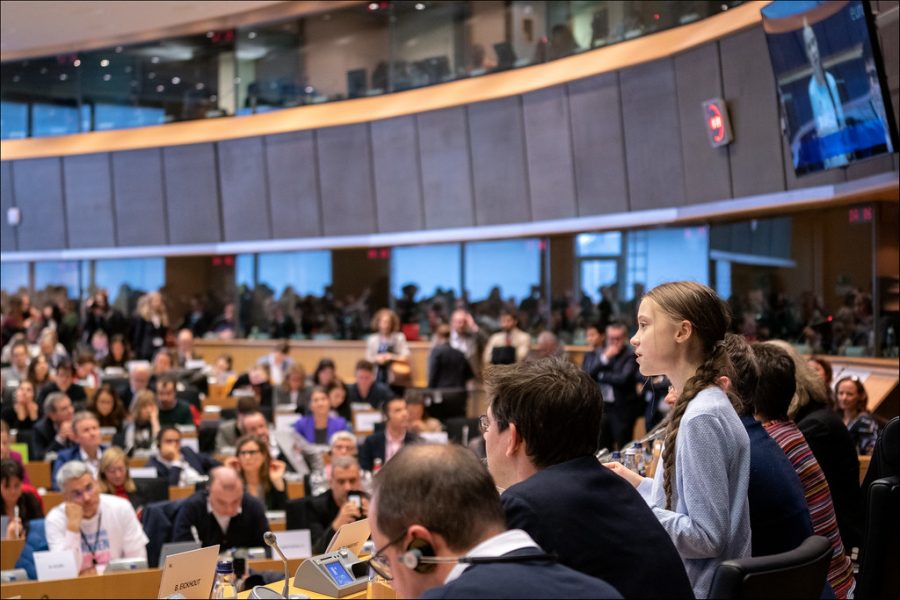Feminism and gaslighting: reflecting on my high school activism
Pietro Naj-Oleari
An advocate for change should keep an open mindset and be confident as a change-maker.
May 28, 2020
Joining journalism my sophomore year was probably one of the most influential and refreshing experiences of high school. The past three years have consisted of our class making a voice for ourselves and an attempt to figure out what our “thing” will be. To some extent we are defined by what we choose to report on — both within room 1205 and outside of it. I’m sure many can quickly identify Kavin as the author of the fiery vegetarianism op, Sarah as a climate change activist, Ronit as the sports guy … the list goes on and on.
After writing about social issues from slacktivism to the refugee crisis, I finally found my passion in writing gender equality articles, whether they be opinions on what the feminist movement should look like or news stories raising awareness about access to period products in the midst of COVID-19.
Throughout my junior and senior years, I slowly started to expand that activism to organizations such as Ms. Magazine and Beyond Resolved, a nonprofit promoting gender equality in the debate space. Their main purpose is to remove socioeconomic barriers for marginalized populations to make debate a more equitable community. Some initiatives they provide are free novice training workshops and a blog where anyone can submit articles about their experiences. Most of my activism within BR consisted of writing opinions and talking to people within the activity.
I guess the biggest question people have and the biggest doubt I carry about my activism is whether it was enough. Why didn’t I choose to push for a larger, more tangible impact beyond words on a page? Honestly, I don’t completely know. Part of me felt guilty for calling feminism my “thing” but not doing anything seemingly effective to further the movement. I’m not going to pretend my activism is perfect — there was ample opportunity for me to take more direct action in addition to my writing. But after some reflection, I don’t regret how I spent my time.
Every op-ed I wrote helped me scrutinize various parts of gender equality and the feminist movement. From discussing identity politics to analyzing hypermasculinity, my beliefs have changed over and over again. It’s kind of like I’m calibrating a moral compass and the only way I can do so is by questioning ideas I hold true by writing and hearing others’ perspectives to
make my thoughts more nuanced and developed. I’ve realized that while I knew I wanted my impact to be large, I needed to use high school to solidify my beliefs and work on small scale advocacy before I branched out.
Moreover, the power of a conversation is often overlooked. The biggest reason these one-on-one interactions are so productive is because they give you the opportunity to directly address someone’s doubts and thoughts. It also allows you to share your story and your experiences, and be the reason someone chooses to change. Countless times, I have talked to men on the debate circuit, telling them about times when I have felt smaller or been treated differently because of my gender. And I think those anecdotes are persuasive, because a movement that may not have affected them before now does, even if it is indirectly.
Having been on the other side of these conversations as well, I can fairly say that these have always been the richest ones I’ve engaged in. That isn’t to say that they are easy to have — they have also been the most frustrating, guilt-inducing ones. It’s hard to admit that you’re wrong, and even harder to change because of them.
As a result, this form of activism disproportionately invites gaslighting — a form of psychological manipulation in which a person or a group covertly sows seeds of doubt in a targeted individual, making them question their own memory, perception, or judgment. While the definition sounds extreme, it does a good job of explaining the term.
My experiences with gaslighting began when I wrote for the Tribune, but really amplified with my work for Beyond Resolved. They usually took the form of jokes made in private group chats and comments said to me in a purposeful attempt to make me angry. From “Sorry, was that too
hypermasculine of me?” to the really uncomfortable language being used to describe me and women around me, jokes about the movement I was standing for exacerbated very quickly, both in the rhetoric and the number of people saying it.
There were so many moments when I felt like these experiences weren’t significant enough for me to care, or were simply isolated incidents to ignore. But after talking to various activists on campus, it’s disappointing to see how normalized gaslighting has become, and even more so, how ok we are with it.
Arshia Mehta, co-founder of Youthivism, a student-led organization striving to educate the next generation of voters through collaboration and bipartisan political awareness, discusses her experiences with gaslighting.
“I think I’ve received a lot of supposedly humorous backlash for Youthivism when hyperliberal people mock the ‘bipartisan’ aspect of our organization … but what’s wrong with pointing out a curriculum-based issue in civics? I support the same candidates and platforms as the hyper liberal people … it has made me question whether I’m a true liberal or not and made me feel like I’m unwelcome in the party or group,” she says.
Others have been labeled as “feminazis” and “raging feminists” for addressing issues such as the wage gap; some deal with snarky comments about how their vegetarian practices affect their health.
At the surface level, these don’t all seem like a big deal. That’s the tricky part of navigating microaggressions: You feel guilty for letting “nothing” get to you when there are relatively worse things to experience. You feel belittled and discouraged from speaking out. You are quiet because you feel both.
I’ve spent a lot of time reflecting on why this type of activism led to these responses in comparison to other forms of activism, like holding drives, campaigns, etc.
Part of the reason is that the change I ask people to make goes deeper than a donation or their time — it’s a change in mindset. Yet, it simultaneously doesn’t seem like a big deal to the person being asked to change. I have repeatedly heard phrases like “it’s just a joke,” or “you need to chill out,” in response to my activism.
These responses are usually triggered by mob mentality. Many of the individuals who tend to lash out are part of groups who think a movement doesn’t matter or that their actions aren’t wrong. If no one around them has a problem with it, then either the problem isn’t that big of a deal. I think there’s also a fear that standing up for an unpopular opinion will label them a
“snowflake” or an “SJW.” I don’t believe that these individuals think the movement is entirely incorrect, but rather that it’s not worth standing up for, especially if it means being isolated from social circles. The consequences of possibly losing friends to stand up for a movement they really have no connection to outweighs the benefit of doing the right thing. It becomes a question of empathy: why do we only let causes that affect us define our morals?
Part of it also has to do with the process. Writing and engaging in conversations is supposed to invite discourse — you will find both your biggest supporters and harshest critics on public platforms. I’ve noticed this is usually the case, not only on an individual basis, but with larger movements.
I noticed that Beyond Resolved as an organization was facing a lot of backlash in comparison to other organizations in the debate space, such as camps with more influence in the community.
One of the most common forms of gaslighting that I notice within Beyond Resolved is the number of times BR’s blog writers get criticized for “victimizing” themselves for sharing their experiences with sexism. Moreover, there were occasions when BR intended to spread educational resources to those who didn’t have access to them, but were met with severe scrutiny from certain members of the community. For context, these educational resources are controversial because many believe that type of argument shouldn’t be normalized in the debate space. However, other debate institutions, such as camps, which have much more power and money, spread these same resources but were not criticized for doing so.
In other words, institutions/individuals are only held accountable based on how easy it is to do so. It’s always easier to tear down an organization/individual with few resources in comparison to the billion-dollar company. This will always disproportionately hurt minority causes and movements that aren’t mainstream, because they are more likely to stray for the norm and have less resources.
There is also an extra layer of scrutiny for activist organizations, because they are trying to convince people to be better in a way that sets them up to be the role model. But because they do that, they are also held to a much higher standard than organizations who don’t take on activist initiatives. The bar for change-makers always tends to be twice as high.
To quote BR Executive Director Yukiho, “My entire role in BR has always been about being forced to justify every decision I make and being criticized for the things I wasn’t doing enough when we are genuinely doing our best.”
While gaslighting may seem to have little consequence, it can be the factor that decides whether an activist continues to pursue their cause or not. Even as I write this, I hate that I feel slightly embarrassed to call out these microaggressions because I have been told over and over again how minor the offense is. There have been times when I have stopped myself from speaking out for fear of being gaslighted and have doubted my ability to make change because of it, and I know this is true for many others. These are genuinely such formative years where young activists figure out what they want to do. The risk of discouraging an activist from following through with their passions should be enough for you to stop.
And most importantly, gaslighting is compounded by structural inequities — minority activists will always be undermined based on their gender, age, disabilities, race … their identity, before the cause they defend.
Take Greta Thunberg, one of the world’s most prominent climate advocates today, for example. Tweets saying “Greta must work on her anger management problem, then go to a good old fashioned movie with a friend!” and comments dismissing her as a “mentally ill Swedish child” attack Greta as a young female with Asperger’s syndrome, NOT her work with the climate movement. These aspects of her identity are not only mocked but are also used as reasoning for why she is uneducated or her opinion is less valid.
Moreover, in a study on the sociology of gaslighting, Paige Sweet, postdoctoral fellow with the Inequality in America Initiative at Harvard University, finds “gaslighting works when perpetrators mobilize gender-based stereotypes, intersecting inequalities, and institutional vulnerabilities against victims … Women do not typically have the cultural, economic, and political capital necessary to gaslight men — gaslighting is therefore a gendered phenomenon. In fact, whether or not it is exercised by a male-bodied person against a female-bodied person, gaslighting tactics construct victims in terms of feminized irrationality.”
Implicit biases become very apparent through gaslighting. At a certain point, the consequences become a question of equality and not the movement, which is why it’s so critical for us to be aware of the words we use.
I’m not saying that we shouldn’t hold change-makers accountable. It’s important for us to continuously question our activism and the activism around us to ensure change is actually happening effectively. For example, this is why Kavin’s opinion piece about movements (while brutally honest) does serve as constructive criticism because it offers important suggestions for the climate movement, something that requires acting in a timely and efficient manner to avoid
devastating consequences.
We often confuse gaslighting with criticism, and I’ve probably been guilty of this as well. I think the best way to tell if you’re gaslighting is to ask yourself the following questions:
- What has this institution/individual done wrong?
- Is there a better way to address their cause, or are their change-making methods the best option, even if it’s not perfect?
- Why am I skeptical of this institution/individual?
- Am I trying to make them a better activist or am I trying to discredit them?
- How am I voicing my criticism in a constructive way?
I think the intent of your criticism decides whether it is constructive or not. Making jokes and personal attacks are usually done in bad faith, and it doesn’t do anything except hinder and deter the activist. That’s really different from asking valid questions respectfully and voicing concerns in the effort of bettering their activism.
I also think that people confuse calling out gaslighting and standing up for activists the same thing as actively being vocal for the movement. You don’t have an obligation to spend effort and capital on a movement you’re not invested in, but it’s important to ensure activists have that safe space for the reasons above.
I urge you to hold the people you know accountable to doing this. Whether that means calling out that friend who makes inappropriate jokes or reflecting on your own actions and words, there are small changes everyone can make, even if they are hard.
I mentioned in the beginning of this article that I surround myself with people who try to be better in journalism, and maybe that’s why I feel particularly strongly about this issue and have a rather sheltered mindset. Maybe I can’t fully relate to those of you who are in friend groups where you would constantly have to call out problematic behavior. But I do think that the people that I chose to be around was a purposeful choice — I want the people around me to inspire me, question me and hold me to high standards. I urge you to ask yourself if you’re surrounding yourself with the people you want to be or are becoming complacent because you don’t want things to change.
As cheesy as it sounds, at the end of the day, we’re all high schoolers who are trying to figure out what we want to do. Everyone’s going to make mistakes that will hopefully show you what I mean directly — no matter what side of the spectrum you fall on. Being optimistic and believing the world can be better is necessary for change. Hold people accountable, but don’t discourage them from doing so.
And to all activists who have been gaslighted:
When I started being more vocal, I had this very idealistic and almost naive vision of what I wanted my change to look like. I needed everyone to get it and to agree with me. And if they didn’t, I used that as a judgement of their character. Maybe that’s why gaslighting hit me particularly hard. The biggest lesson I have learned in the past few years is that everyone
has different thought processes, and their not changing now is not an indication of what they will do in the future. Take the time to decide what you can forgive, but recognize when someone doesn’t follow through on their words and is spitting you and your efforts, rather than making you stronger. The most you can do is share your opinions and hope that something sticks with them and shows in their actions.
And most of all, have an open mindset and don’t generalize all criticism as gaslighting. Continue to develop your thinking, and realize it’s okay to change your mind — that’s how you grow as a change-maker and it shouldn’t harm your confidence. But be cognizant of when someone’s lack of action and hurtful words jeopardizes your safe space as an advocate.



